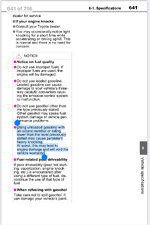I've seen a lot of debate about premium vs. non-premium fuel. I suggest everyone watch this video. You can skip to the 17:07 mark. The whole video is good, but he specifically addresses premium fuel at the time mark I provide. I guess there are those who don't value this guy's opinion, but he seems to know more about Toyotas than any other mechanic out there.
8:45….



